ACCT19061 Advanced Financial Accounting: Detailed Assignment Solution
VerifiedAdded on 2023/06/12
|7
|1191
|441
Homework Assignment
AI Summary
This assignment solution addresses questions related to Netcomm Wireless's financial activities, focusing on financial instruments and income tax. It identifies Netcomm Wireless's business segments and clarifies the definition and recognition of financial instruments and derivatives. The solution also discusses income tax benefits, current and deferred tax expenses, and the reconciliation of income tax on profit before tax. Furthermore, it explains the differences between tax expenses reported by the company and income tax paid to the ATO, highlighting the use of accounting income versus taxable income in calculations. Desklib offers a wealth of similar documents and study resources for students.
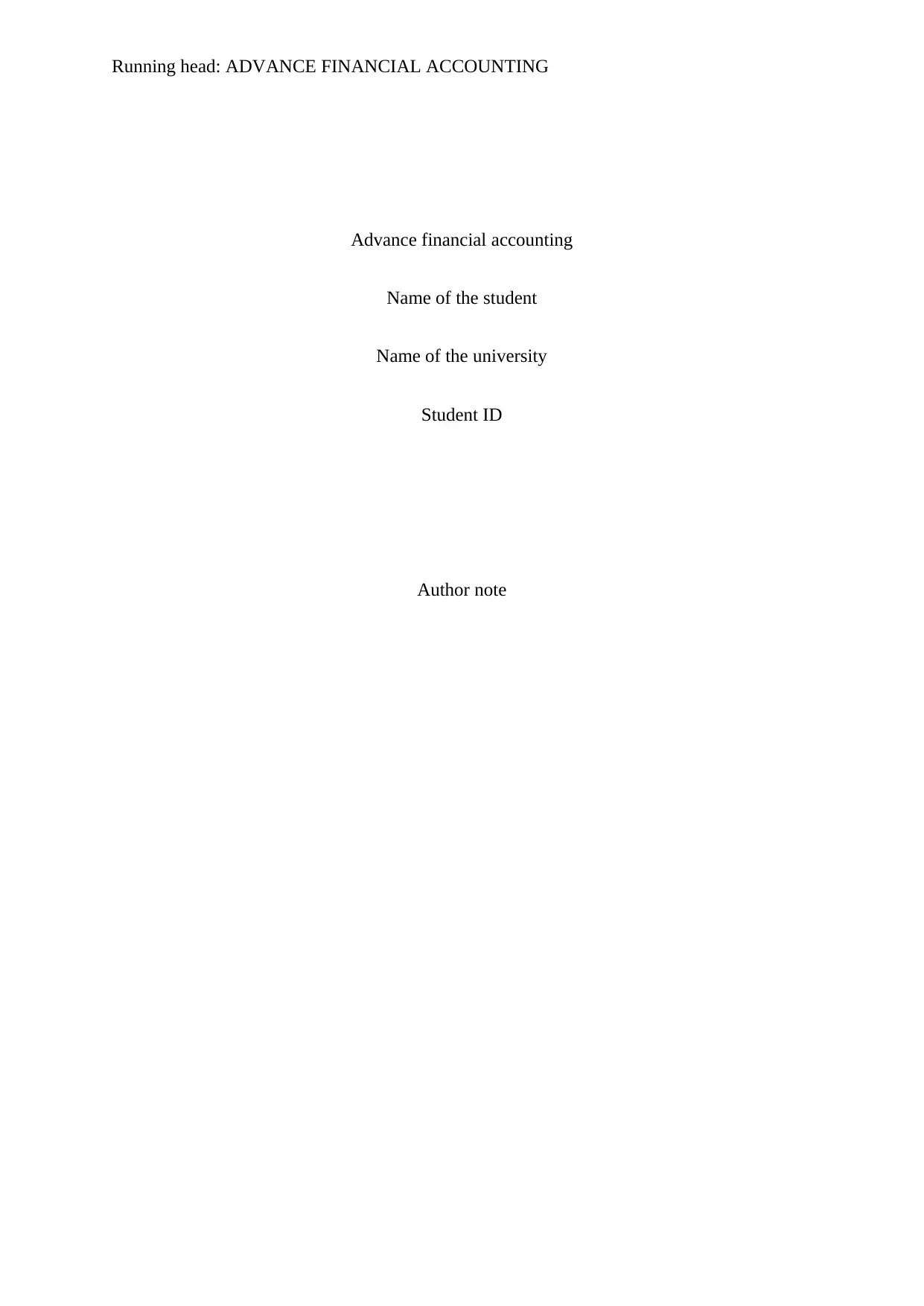
Running head: ADVANCE FINANCIAL ACCOUNTING
Advance financial accounting
Name of the student
Name of the university
Student ID
Author note
Advance financial accounting
Name of the student
Name of the university
Student ID
Author note
Paraphrase This Document
Need a fresh take? Get an instant paraphrase of this document with our AI Paraphraser
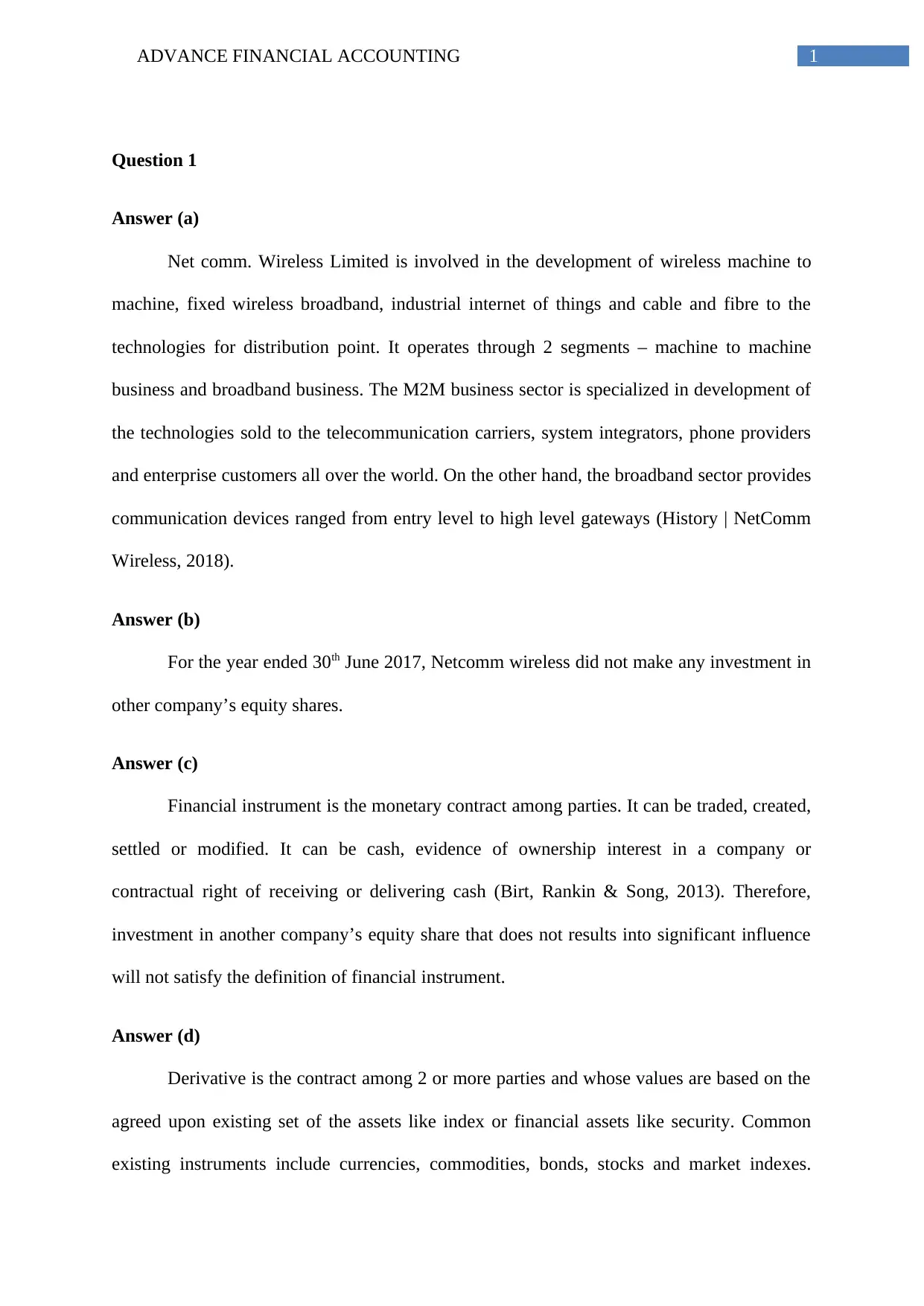
1ADVANCE FINANCIAL ACCOUNTING
Question 1
Answer (a)
Net comm. Wireless Limited is involved in the development of wireless machine to
machine, fixed wireless broadband, industrial internet of things and cable and fibre to the
technologies for distribution point. It operates through 2 segments – machine to machine
business and broadband business. The M2M business sector is specialized in development of
the technologies sold to the telecommunication carriers, system integrators, phone providers
and enterprise customers all over the world. On the other hand, the broadband sector provides
communication devices ranged from entry level to high level gateways (History | NetComm
Wireless, 2018).
Answer (b)
For the year ended 30th June 2017, Netcomm wireless did not make any investment in
other company’s equity shares.
Answer (c)
Financial instrument is the monetary contract among parties. It can be traded, created,
settled or modified. It can be cash, evidence of ownership interest in a company or
contractual right of receiving or delivering cash (Birt, Rankin & Song, 2013). Therefore,
investment in another company’s equity share that does not results into significant influence
will not satisfy the definition of financial instrument.
Answer (d)
Derivative is the contract among 2 or more parties and whose values are based on the
agreed upon existing set of the assets like index or financial assets like security. Common
existing instruments include currencies, commodities, bonds, stocks and market indexes.
Question 1
Answer (a)
Net comm. Wireless Limited is involved in the development of wireless machine to
machine, fixed wireless broadband, industrial internet of things and cable and fibre to the
technologies for distribution point. It operates through 2 segments – machine to machine
business and broadband business. The M2M business sector is specialized in development of
the technologies sold to the telecommunication carriers, system integrators, phone providers
and enterprise customers all over the world. On the other hand, the broadband sector provides
communication devices ranged from entry level to high level gateways (History | NetComm
Wireless, 2018).
Answer (b)
For the year ended 30th June 2017, Netcomm wireless did not make any investment in
other company’s equity shares.
Answer (c)
Financial instrument is the monetary contract among parties. It can be traded, created,
settled or modified. It can be cash, evidence of ownership interest in a company or
contractual right of receiving or delivering cash (Birt, Rankin & Song, 2013). Therefore,
investment in another company’s equity share that does not results into significant influence
will not satisfy the definition of financial instrument.
Answer (d)
Derivative is the contract among 2 or more parties and whose values are based on the
agreed upon existing set of the assets like index or financial assets like security. Common
existing instruments include currencies, commodities, bonds, stocks and market indexes.
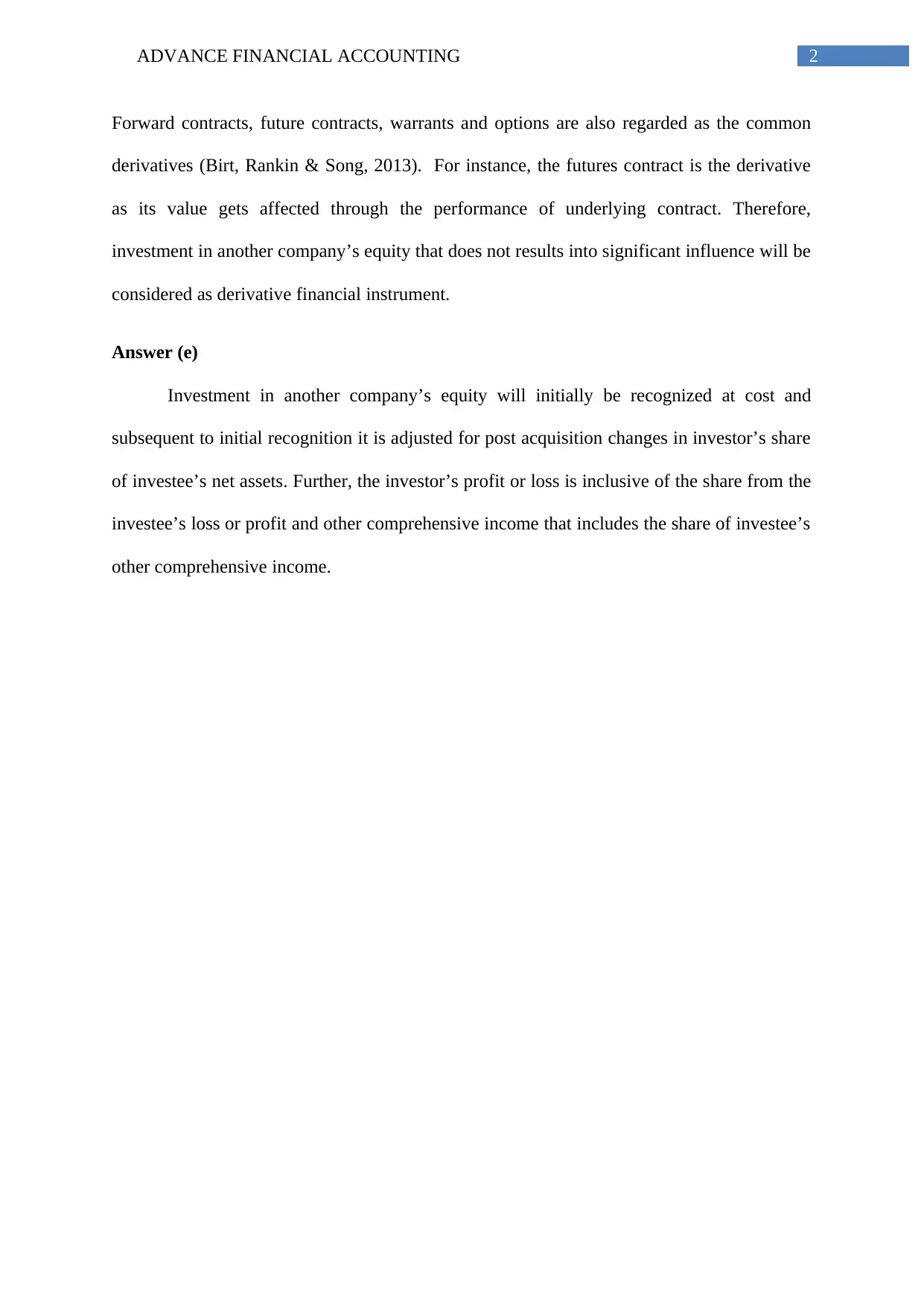
2ADVANCE FINANCIAL ACCOUNTING
Forward contracts, future contracts, warrants and options are also regarded as the common
derivatives (Birt, Rankin & Song, 2013). For instance, the futures contract is the derivative
as its value gets affected through the performance of underlying contract. Therefore,
investment in another company’s equity that does not results into significant influence will be
considered as derivative financial instrument.
Answer (e)
Investment in another company’s equity will initially be recognized at cost and
subsequent to initial recognition it is adjusted for post acquisition changes in investor’s share
of investee’s net assets. Further, the investor’s profit or loss is inclusive of the share from the
investee’s loss or profit and other comprehensive income that includes the share of investee’s
other comprehensive income.
Forward contracts, future contracts, warrants and options are also regarded as the common
derivatives (Birt, Rankin & Song, 2013). For instance, the futures contract is the derivative
as its value gets affected through the performance of underlying contract. Therefore,
investment in another company’s equity that does not results into significant influence will be
considered as derivative financial instrument.
Answer (e)
Investment in another company’s equity will initially be recognized at cost and
subsequent to initial recognition it is adjusted for post acquisition changes in investor’s share
of investee’s net assets. Further, the investor’s profit or loss is inclusive of the share from the
investee’s loss or profit and other comprehensive income that includes the share of investee’s
other comprehensive income.
⊘ This is a preview!⊘
Do you want full access?
Subscribe today to unlock all pages.

Trusted by 1+ million students worldwide
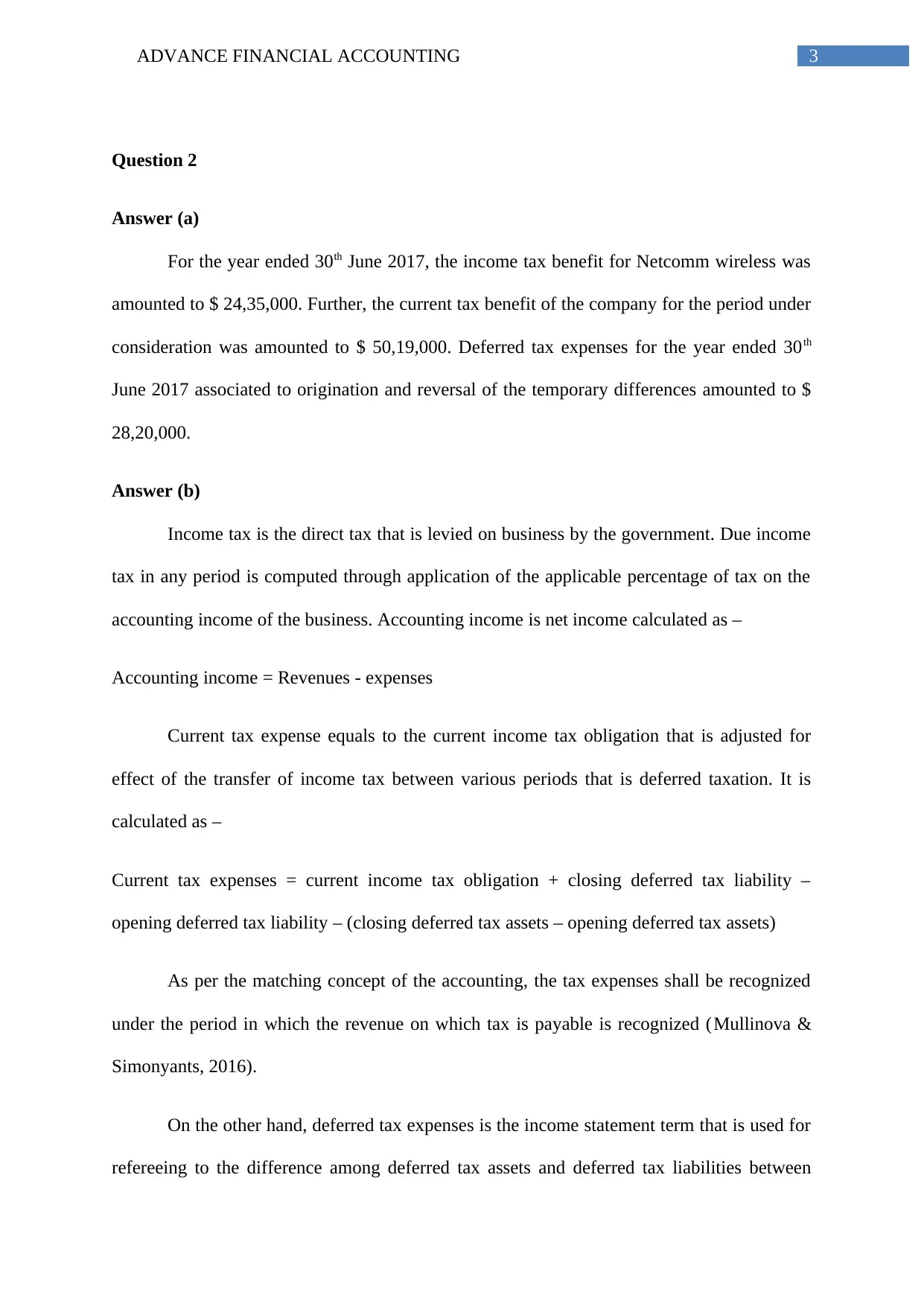
3ADVANCE FINANCIAL ACCOUNTING
Question 2
Answer (a)
For the year ended 30th June 2017, the income tax benefit for Netcomm wireless was
amounted to $ 24,35,000. Further, the current tax benefit of the company for the period under
consideration was amounted to $ 50,19,000. Deferred tax expenses for the year ended 30th
June 2017 associated to origination and reversal of the temporary differences amounted to $
28,20,000.
Answer (b)
Income tax is the direct tax that is levied on business by the government. Due income
tax in any period is computed through application of the applicable percentage of tax on the
accounting income of the business. Accounting income is net income calculated as –
Accounting income = Revenues - expenses
Current tax expense equals to the current income tax obligation that is adjusted for
effect of the transfer of income tax between various periods that is deferred taxation. It is
calculated as –
Current tax expenses = current income tax obligation + closing deferred tax liability –
opening deferred tax liability – (closing deferred tax assets – opening deferred tax assets)
As per the matching concept of the accounting, the tax expenses shall be recognized
under the period in which the revenue on which tax is payable is recognized (Mullinova &
Simonyants, 2016).
On the other hand, deferred tax expenses is the income statement term that is used for
refereeing to the difference among deferred tax assets and deferred tax liabilities between
Question 2
Answer (a)
For the year ended 30th June 2017, the income tax benefit for Netcomm wireless was
amounted to $ 24,35,000. Further, the current tax benefit of the company for the period under
consideration was amounted to $ 50,19,000. Deferred tax expenses for the year ended 30th
June 2017 associated to origination and reversal of the temporary differences amounted to $
28,20,000.
Answer (b)
Income tax is the direct tax that is levied on business by the government. Due income
tax in any period is computed through application of the applicable percentage of tax on the
accounting income of the business. Accounting income is net income calculated as –
Accounting income = Revenues - expenses
Current tax expense equals to the current income tax obligation that is adjusted for
effect of the transfer of income tax between various periods that is deferred taxation. It is
calculated as –
Current tax expenses = current income tax obligation + closing deferred tax liability –
opening deferred tax liability – (closing deferred tax assets – opening deferred tax assets)
As per the matching concept of the accounting, the tax expenses shall be recognized
under the period in which the revenue on which tax is payable is recognized (Mullinova &
Simonyants, 2016).
On the other hand, deferred tax expenses is the income statement term that is used for
refereeing to the difference among deferred tax assets and deferred tax liabilities between
Paraphrase This Document
Need a fresh take? Get an instant paraphrase of this document with our AI Paraphraser
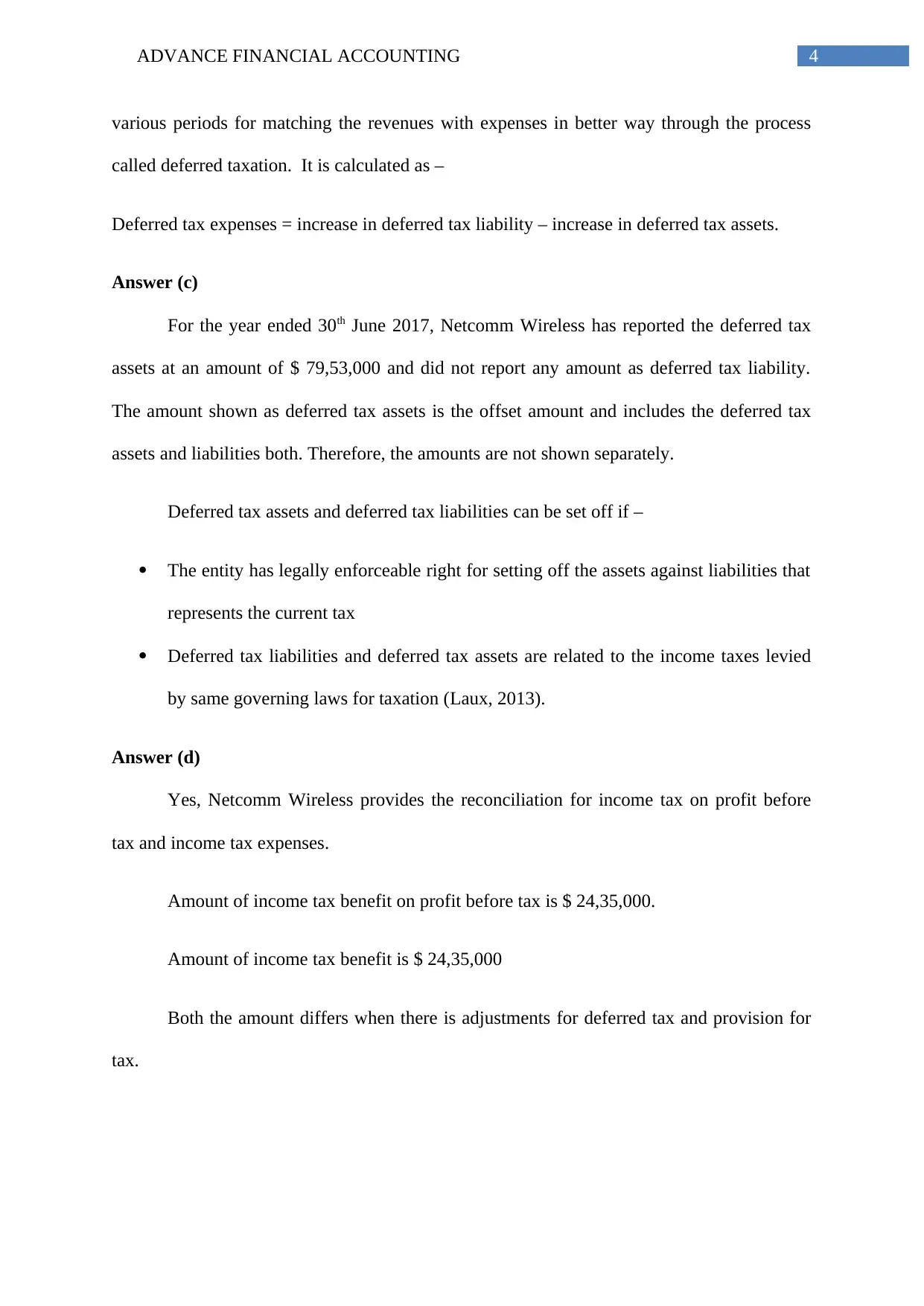
4ADVANCE FINANCIAL ACCOUNTING
various periods for matching the revenues with expenses in better way through the process
called deferred taxation. It is calculated as –
Deferred tax expenses = increase in deferred tax liability – increase in deferred tax assets.
Answer (c)
For the year ended 30th June 2017, Netcomm Wireless has reported the deferred tax
assets at an amount of $ 79,53,000 and did not report any amount as deferred tax liability.
The amount shown as deferred tax assets is the offset amount and includes the deferred tax
assets and liabilities both. Therefore, the amounts are not shown separately.
Deferred tax assets and deferred tax liabilities can be set off if –
The entity has legally enforceable right for setting off the assets against liabilities that
represents the current tax
Deferred tax liabilities and deferred tax assets are related to the income taxes levied
by same governing laws for taxation (Laux, 2013).
Answer (d)
Yes, Netcomm Wireless provides the reconciliation for income tax on profit before
tax and income tax expenses.
Amount of income tax benefit on profit before tax is $ 24,35,000.
Amount of income tax benefit is $ 24,35,000
Both the amount differs when there is adjustments for deferred tax and provision for
tax.
various periods for matching the revenues with expenses in better way through the process
called deferred taxation. It is calculated as –
Deferred tax expenses = increase in deferred tax liability – increase in deferred tax assets.
Answer (c)
For the year ended 30th June 2017, Netcomm Wireless has reported the deferred tax
assets at an amount of $ 79,53,000 and did not report any amount as deferred tax liability.
The amount shown as deferred tax assets is the offset amount and includes the deferred tax
assets and liabilities both. Therefore, the amounts are not shown separately.
Deferred tax assets and deferred tax liabilities can be set off if –
The entity has legally enforceable right for setting off the assets against liabilities that
represents the current tax
Deferred tax liabilities and deferred tax assets are related to the income taxes levied
by same governing laws for taxation (Laux, 2013).
Answer (d)
Yes, Netcomm Wireless provides the reconciliation for income tax on profit before
tax and income tax expenses.
Amount of income tax benefit on profit before tax is $ 24,35,000.
Amount of income tax benefit is $ 24,35,000
Both the amount differs when there is adjustments for deferred tax and provision for
tax.
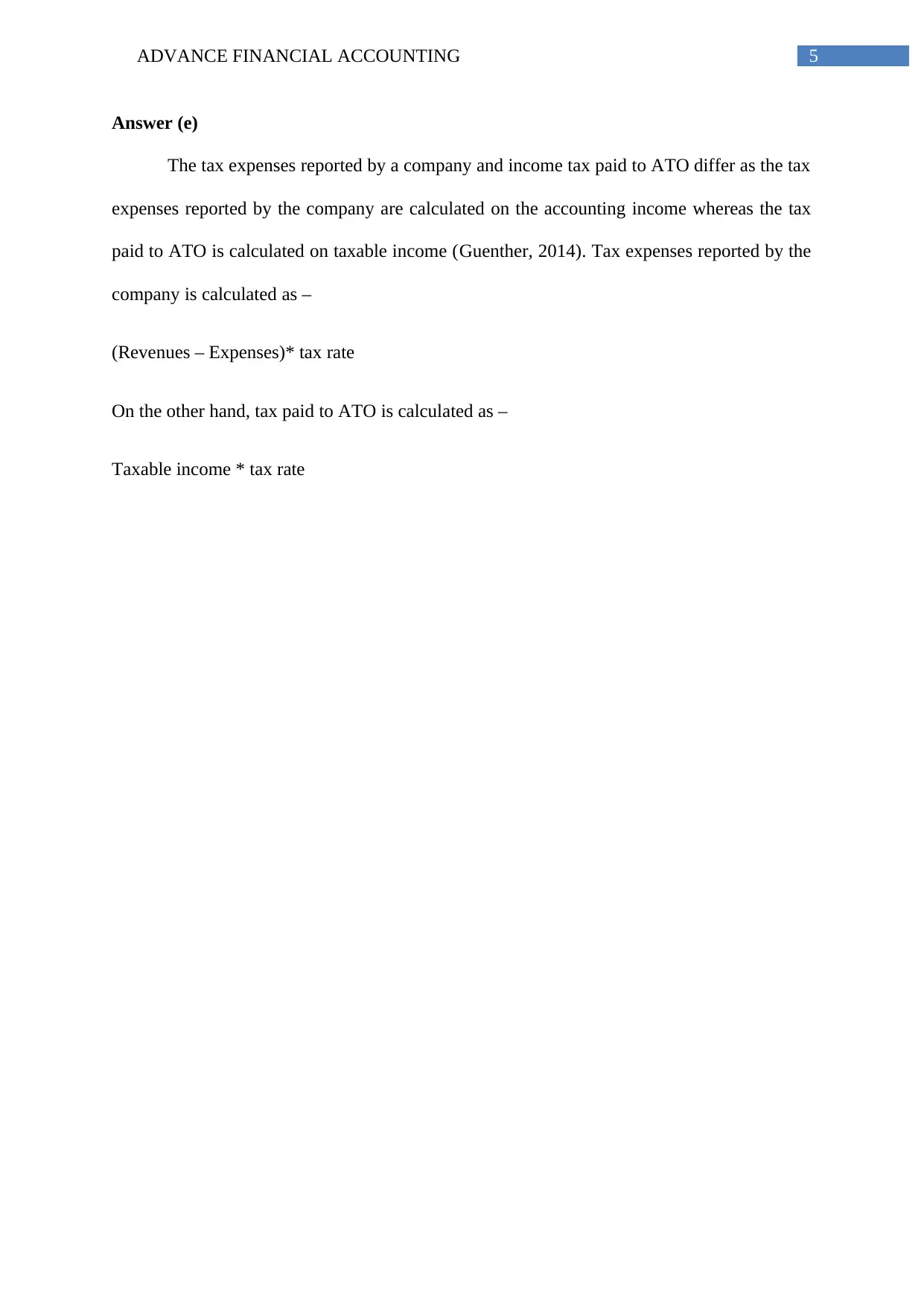
5ADVANCE FINANCIAL ACCOUNTING
Answer (e)
The tax expenses reported by a company and income tax paid to ATO differ as the tax
expenses reported by the company are calculated on the accounting income whereas the tax
paid to ATO is calculated on taxable income (Guenther, 2014). Tax expenses reported by the
company is calculated as –
(Revenues – Expenses)* tax rate
On the other hand, tax paid to ATO is calculated as –
Taxable income * tax rate
Answer (e)
The tax expenses reported by a company and income tax paid to ATO differ as the tax
expenses reported by the company are calculated on the accounting income whereas the tax
paid to ATO is calculated on taxable income (Guenther, 2014). Tax expenses reported by the
company is calculated as –
(Revenues – Expenses)* tax rate
On the other hand, tax paid to ATO is calculated as –
Taxable income * tax rate
⊘ This is a preview!⊘
Do you want full access?
Subscribe today to unlock all pages.

Trusted by 1+ million students worldwide
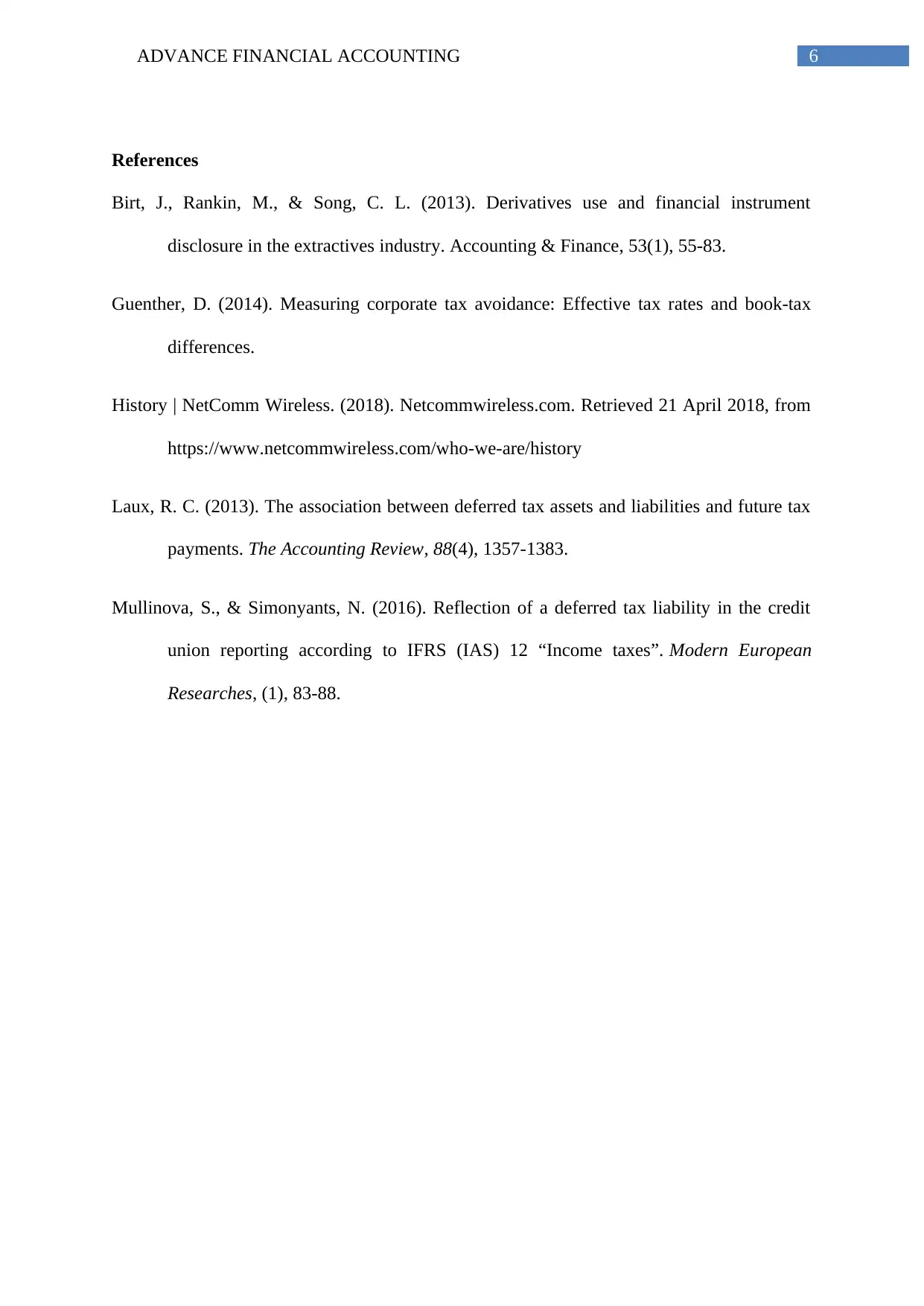
6ADVANCE FINANCIAL ACCOUNTING
References
Birt, J., Rankin, M., & Song, C. L. (2013). Derivatives use and financial instrument
disclosure in the extractives industry. Accounting & Finance, 53(1), 55-83.
Guenther, D. (2014). Measuring corporate tax avoidance: Effective tax rates and book-tax
differences.
History | NetComm Wireless. (2018). Netcommwireless.com. Retrieved 21 April 2018, from
https://www.netcommwireless.com/who-we-are/history
Laux, R. C. (2013). The association between deferred tax assets and liabilities and future tax
payments. The Accounting Review, 88(4), 1357-1383.
Mullinova, S., & Simonyants, N. (2016). Reflection of a deferred tax liability in the credit
union reporting according to IFRS (IAS) 12 “Income taxes”. Modern European
Researches, (1), 83-88.
References
Birt, J., Rankin, M., & Song, C. L. (2013). Derivatives use and financial instrument
disclosure in the extractives industry. Accounting & Finance, 53(1), 55-83.
Guenther, D. (2014). Measuring corporate tax avoidance: Effective tax rates and book-tax
differences.
History | NetComm Wireless. (2018). Netcommwireless.com. Retrieved 21 April 2018, from
https://www.netcommwireless.com/who-we-are/history
Laux, R. C. (2013). The association between deferred tax assets and liabilities and future tax
payments. The Accounting Review, 88(4), 1357-1383.
Mullinova, S., & Simonyants, N. (2016). Reflection of a deferred tax liability in the credit
union reporting according to IFRS (IAS) 12 “Income taxes”. Modern European
Researches, (1), 83-88.
1 out of 7
Related Documents
Your All-in-One AI-Powered Toolkit for Academic Success.
+13062052269
info@desklib.com
Available 24*7 on WhatsApp / Email
![[object Object]](/_next/static/media/star-bottom.7253800d.svg)
Unlock your academic potential
Copyright © 2020–2025 A2Z Services. All Rights Reserved. Developed and managed by ZUCOL.





